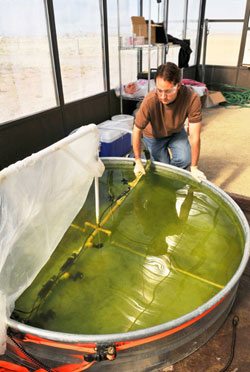
Australia is a step closer to creating commercial quantities of an algae-based biofuel with the opening of a pilot plant in the Western part of the country.
The A$3.3 million ($3.28 million) project is headed by Michael Borowitzka, a professor atMurdoch University.
Borowitzka leads the world’s algae biofuel research after more than two years of consistent results at both Murdoch and the University of Adelaide in South Australia.
He previously helped develop the largest microalgae production plant in the world, the Dunaliella salina plant at Hutt Lagoon in Western Australia.
“We have achieved production rates of 50 tonnes a hectare (18.3 tons/acre) per year, about half of which is converted to oil,” he says in a statement. “These high production rates are expected to increase at the new pilot plant due to better climatic conditions in Karratha.”
Karratha, 970 miles (1,550 km) north of Perth, has a year-round warm climate.
The project received A$1.9 million ($1.88 million) in funding from the Australian government as part of the Asia-Pacific Partnership on Clean Development and Climate.
It is the only project in the country working on all steps of the process of microalgal biofuels production.

“The integration of microalgae culture, harvesting of algae and the extraction of oil suitable for biofuels production is critical to achieve a commercially and environmentally sustainable outcome,” Borowitzka says.
Making biofuels from algae has been technically feasible for some time, but the high cost of production has prevented it from becoming a reality.
“We have already dropped the cost from A$12 a liter ($45/gallon) down to A$3 a liter ($11.28/gallon) in the past year, but our aim is to (lower) it to less than $1 a liter ($3.75/gallon),” Borowitzka says.
Bringing down the costs is not a simple process, he adds, and the purpose of the project is to find out if it can be done and how long it will take.
“The pilot plant in Karratha will allow us to further refine the production process and demonstrate the commercial feasibility under realistic conditions.”
“We will test lipid (oil) productivity of the elite saline microalgae strains developed by Murdoch and the new harvesting and lipids extraction methods developed at the University of Adelaide, on a large scale.”
The project also is investigating the anticipated reduction in carbon emissions of algae-produced fuel. Algae comprise about 40% oil, and the team is looking at using the remaining 60% biomass to create methane to power the plant.




